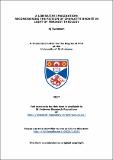Files in this item
A liberative imagination : reconsidering the fiction of Charlotte Brontë in light of feminist theology
Item metadata
| dc.contributor.advisor | Hopps, Gavin | |
| dc.contributor.author | Swanson, Kj | |
| dc.coverage.spatial | ix, 265 p. | en_US |
| dc.date.accessioned | 2017-06-21T15:38:45Z | |
| dc.date.available | 2017-06-21T15:38:45Z | |
| dc.date.issued | 2017-06-20 | |
| dc.identifier.uri | https://hdl.handle.net/10023/11051 | |
| dc.description.abstract | This thesis seeks to show the ways in which Charlotte Brontë’s fiction anticipates the concerns of contemporary feminist theology. Whilst Charlotte Brontë’s novels have held a place of honor in feminist literary criticism for decades, there has been a critical tendency to associate the proto-feminism of Brontë’s narratives with a rejection of Christianity—namely, that Brontë’s heroines achieve their personal, social and spiritual emancipation by throwing off the shackles of a patriarchal Church Establishment. And although recent scholarly interest in Victorian Christianity has led to frequent interpretations that regard Brontë’s texts as upholding a Christian worldview, in many such cases, the theology asserted in those interpretations arguably undermines the liberative impulse of the narratives. In both cases, the religious and romantic plots of Brontë’s novels are viewed as incompatible. This thesis suggests that by reading Brontë’s fiction in light of an interdisciplinary perspective that interweaves feminist and theological concerns, the narrative journeys of Brontë’s heroines might be read as affirming both Christian faith and female empowerment. Specifically, this thesis will examine the ways in which feminist theologians have identified the need for Christian doctrines of sin and grace to be articulated in a manner that better reflects women’s experiences. By exploring the interrelationship between women’s writing and women’s faith, particularly as it relates to the literary origins of feminist theology and Brontë’s position within the nineteenth-century female publishing boom, Brontë’s liberative imagination for female flourishing can be re-examined. As will be argued, when considered from the vantage point of feminist theology, 'Jane Eyre', 'Shirley', and 'Villette' portray women’s need to experience grace as self-construction and interdependence rather than self-denial and subjugation. | en_US |
| dc.language.iso | en | en_US |
| dc.publisher | University of St Andrews | |
| dc.subject | Charlotte Brontë | en_US |
| dc.subject | Feminist theology | en_US |
| dc.subject | Jane Eyre | en_US |
| dc.subject | Villette | en_US |
| dc.subject | Literature | en_US |
| dc.subject | Patriarchy | en_US |
| dc.subject | Victorian literature | en_US |
| dc.subject | Victorian society | en_US |
| dc.subject | Shirley | en_US |
| dc.subject | Feminist ethics | en_US |
| dc.subject | Spiritual formation | en_US |
| dc.subject | Feminist criticism | en_US |
| dc.subject | Literary criticism | en_US |
| dc.subject | Christian theology | en_US |
| dc.subject | Christian soteriology | en_US |
| dc.subject | Doctrine of Grace | en_US |
| dc.subject | Gender | en_US |
| dc.subject | Sin | en_US |
| dc.subject | Equality | en_US |
| dc.subject | Female empowerment | en_US |
| dc.subject | Female agency | en_US |
| dc.subject | Evangelicalism | en_US |
| dc.subject | Church of England | en_US |
| dc.subject | Romanticism | en_US |
| dc.subject.lcc | PR4169.S82 | |
| dc.subject.lcsh | Brontë, Charlotte, 1816-1855--Criticism and interpretation | en |
| dc.subject.lcsh | Brontë, Charlotte, 1816-1855. Jane Eyre | en |
| dc.subject.lcsh | Brontë, Charlotte, 1816-1855. Shirley | en |
| dc.subject.lcsh | Brontë, Charlotte, 1816-1855. Villette | en |
| dc.subject.lcsh | Feminist theology | en |
| dc.subject.lcsh | Grace (Theology) in literature | en |
| dc.title | A liberative imagination : reconsidering the fiction of Charlotte Brontë in light of feminist theology | en_US |
| dc.type | Thesis | en_US |
| dc.type.qualificationlevel | Doctoral | en_US |
| dc.type.qualificationname | PhD Doctor of Philosophy | en_US |
| dc.publisher.institution | The University of St Andrews | en_US |
This item appears in the following Collection(s)
Items in the St Andrews Research Repository are protected by copyright, with all rights reserved, unless otherwise indicated.

